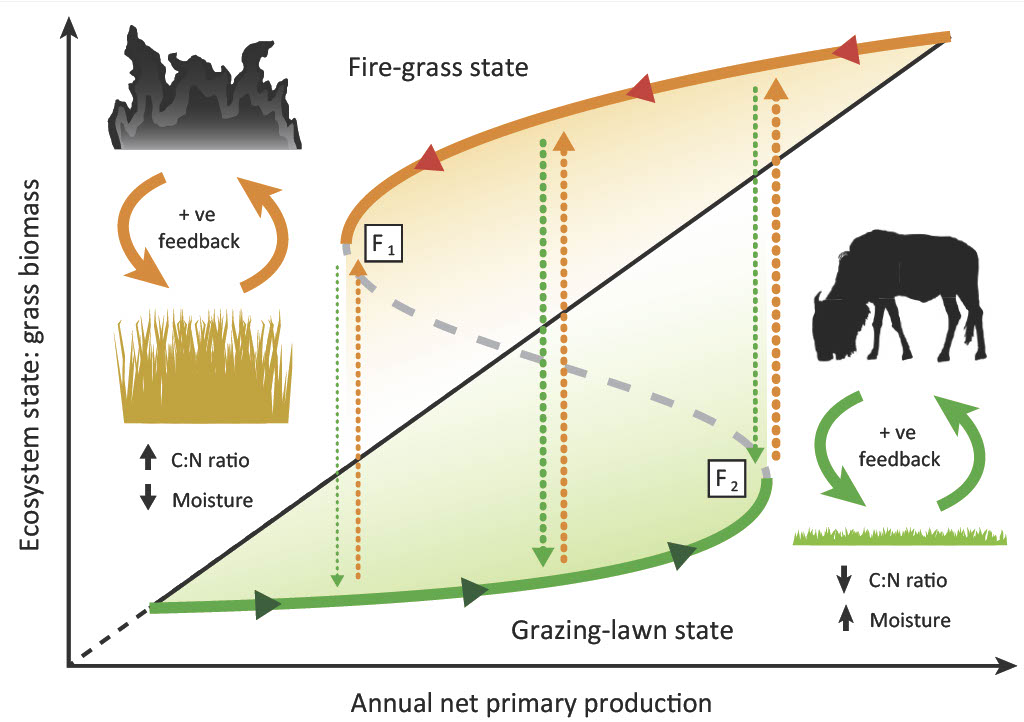Theoretical Ecology
You are here

Theoretical Ecology
Bifurcations in dynamical systems
Monday 10 - Friday 14 October 2022
Hotel De Bosrand, Ede (NL)
Scope
This first instance of a PhD course on Theoretical Ecology will focus on qualitative changes in dynamics of biological systems that occur when conditions change. Examples of such qualitative changes are when a system changes from being in a constant and stable equilibrium state to exhibiting fluctuations, that is, cyclic dynamics. As another example, even in popular media we may nowadays encounter the term ‘tipping point.’ For example, in the fifth report of the IPCC (the Intergovernmental Panel on Climate Change) a tipping point is defined as an irreversible change in the climate system. These qualitative changes in dynamics occur in many different systems and at many different levels of organization. They are generic phenomena in mathematical models when the value of a particular model parameter changes. These qualitative transitions in dynamics are called bifurcations. The course aims at giving students an understanding about possible phenomena in dynamic models and transitions between different dynamical outcomes, as well as practical training how to apply the theory themselves. The basics are going to be taught while focusing on simple ordinary differential equation (ODE) models. We will then add to it and also discuss the connections to more complex models, such as individual-based models, spatial models or physiologically structured models.
Set-up
The course will start on Monday morning and end on Friday at lunch time. The course is composed of:
1. Introduction lectures
The course starts off on Monday morning with an introductory lecture on the theory and relevance of bifurcation models is explained. Background information will be given in lectures by the course organisers, followed by hands-on application in the computer labs.
2. Computer labs
The computer labs in the afternoons will provide the opportunity of practical training how to apply the theory. Students should bring a laptop with a recent version of R (version 4.0 or higher) and Rstudio installed (the exact version is not so important, just that it is recent). Preferably, students should install the required R package already before the start of the course by issuing the command: install.packages("deBif") in Rstudio. This will also immediately make clear that the laptop is properly set up for the course.
3. Evening sessions
Evening hours will be filled with presentations about applications in different case studies.
4. Poster carousel
After dinner of the first day of the course there will be a poster carousel during which participants present themselves, their research and interest in the course. The carousel will consist of approx. 5 sessions. Per session approx. 5 participants present their poster (5-10 minutes), followed by 5-10 minutes discussion. Between sessions there is a 5-minute break to switch. For the next session. The schedule of the carousel can be found further on in this hand-out. Posters will be displayed on the walls of the course venue throughout the course.
5. Key-note/guest lecture
As guest lecturer, Prof. Max Rietkerk (Utrecht University) will give 2 lectures about his work on spatial interactions in ecosystems, which represent prominent examples of the power of bifurcation theory for understanding the dynamics of real ecosystems.
Lecture notes about bifurcations in biological dynamics: https://staff.fnwi.uva.nl/a.m.deroos/projects/BifurcationTheory/.
Programme (preliminary)
Monday 10 October
Topic: Introduction to theory
Evening: Poster carousel
Tuesday 11 October
Topic: Basic bifurcation models
Evening: Presentations about applications in different case studies
Wednesday 12 October
Topic: Bifurcation models based on spatial systems (by guest lecturer Max Rietkerk)
Evening: Presentations about applications in different case studies
Thursday 13 October
Topic: Bifurcations in structured population models
Evening: Presentations about applications in different case studies
Friday 14 October
Topic: Bifurcations in individual-based simulation models
Afternoon: Course wrap-up
Confirmed Speakers
Course organisers
- Prof. dr. André de Roos (Theoretical and Computational Ecology, Institute for Biodiversity and Ecosystem Dynamics, University of Amsterdam)
- Dr. Ben Martin (Theoretical and Computational Ecology, Institute for Biodiversity and Ecosystem Dynamics, University of Amsterdam)
- Jasper Croll (Theoretical and Computational Ecology, Institute for Biodiversity and Ecosystem Dynamics, University of Amsterdam)
- Dr. Claudius van de Vijver (Graduate School PE&RC)
General information
| Target Group | The course is aimed at PhD candidates, postdocs, and other academics |
| Group Size | Min. 20, max. 25 participants |
| Course duration | 5 days |
| Language of instruction | English |
| Frequency of recurrence | Every three years |
| Number of credits | 1.5 ECTS |
| Lecturers | See above |
| Prior knowledge | Basic knowledge of theoretical ecological models is assumed |
| Location | Hotel De Bosrand, Ede (NL) |
Fees 1
| EARLY-BIRD FEE 2 | REGULAR FEE 2 | |
| PE&RC / WIMEK / VLAG / WIAS / WASS / EPS / RSEE PhD candidates with an approved TSP | € 250,- | € 300,- |
| All other PhD candidates Postdocs and staff of the above mentioned Graduate Schools |
€ 580,- | € 630,- |
| All others | € 830,- | € 880,- |
1 The course fee includes accommodation, all meals, course materials, coffee/tea, and water. It does not include beverages in the bar.
2 The Early-Bird Fee applies to anyone who REGISTERS ON OR BEFORE 1 August 2022
Note:
- If you need an invoice to complete your payment, please send an email to office.pe@wur.nl, including ALL relevant details that should be mentioned on the invoice (e.g., purchase order no., specific addresses, attendees, etc.).
- The Early-Bird policy is such that the moment of REGISTRATION (and not payment) is leading for determining the fee that applies to you.
- Please make sure that your payment is arranged within two weeks after your registration.
- It is the participant's responsibility to make sure that he/she (or his/her secretary) completes the payment correctly and in time.
PE&RC Cancellation Conditions
- Up to 4 (four) weeks prior to the start of the course, cancellation is free of charge.
- Up to 2 (two) weeks prior to the start of the course, a fee of € 250,- will be charged.
- In case of cancellation within two weeks prior to the start of the course, a fee of € 580,- will be charged.
- If you do not show at all, a fee of € 830,- will nevertheless be charged.
Note: If you would like to cancel your registration, ALWAYS inform us. By NOT paying the participation fee, your registration is NOT automatically cancelled (and do note that you will be kept to the cancellation conditions)
More information
Prof. dr. André de Roos
Email: A.M.deRoos@uva.nl
Dr. Claudius van de Vijver (PE&RC)
Phone: +31 (0) 317 485116
Email: claudius.vandevijver@wur.nl
Registration
To register, please enter your details below and click "Register".
